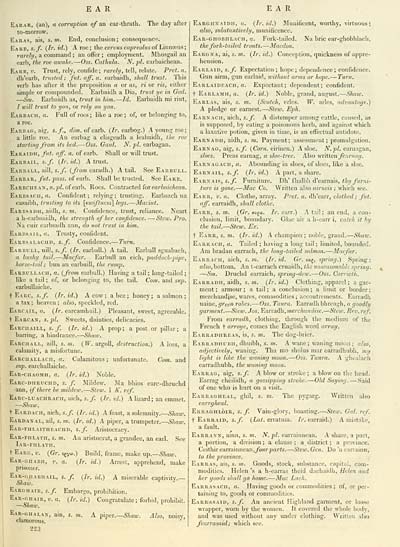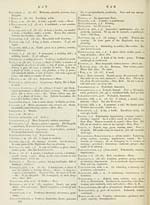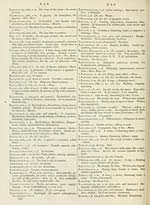Download files
Complete book:
Individual page:
Thumbnail gallery: Grid view | List view

EAR
EAR
Earar, (an), a corruption o/ an ear-thrath. The day after
to-morrow.
Earas, ais, s. 7n. End, conclusion; consequence.
Earb, s.f. {Ir. id.) A roe; the ceri'ws cn/;reD/i(s of Linnaeus ;
rarely, a command ; an offer ; employment. Mhosgail an
earb, the roe awake. — Oss. Cathula. N. pi. earbaichean.
Earb, v. Trust, rely, confide; rarely, tell, relate. Pret. a.
dh'earb, trusted; fut. aff. a. earbaidh, shall trust. This
verb has after it the preposition a or as, ri or ris, either
simple or compounded. Earbaidh a Dia, trust ye in God.
— Sm. Earbaidh as, trust in him. — Id. Earbaidh mi riut,
/ will trust to you, or rely on you.
Earbacii, a. Full of roes; like a roe; of, or belonging to,
a roe.
Eaurac, aig, s.f., rfi'm. of earb. (/r. earbog.) A young roe;
a little roe. An earbag a clisgeadh a leabaidh, the roe
starting from its bed. — Oss. Gaul. N. pi. earbagan.
Earaidii, /;(/. ajf. a. of earb. Shall or will trust.
Earbail, s.f. (Ir. id.) A trust.
Earb ALL, aill, s./. (/;om earadh.) A tail. See Eaubcll.
Earbar, fut. pass, of earb. Shall be trusted. See Bare.
Earbciieax, n.pl. of earb. Roes. Contracted (or earbaichean.
Earbsacii, a. Confident; relying; trusting. Earbsach na
casaibh, trusting to its [swiftness] legs. — Macint.
Earbsadh, aidh, s. m. Confidence, trust, reliance. Neart
a h-earbsaidh, tlie strength of her confidence. — -Stew. Pro.
Na cuir earbsadh ann, do not trust in him.
Eaudsail, a. Trusty, confident.
Earbsalachd, s.f. Confidence. — Turn.
Earbull, uill, s.f. (Ir. earbail.) A tail. Earbail sguabach,
a bushy tail. — Macfar. Earbull an eich, paddock-pipe,
horse-tail ; bun an earbuill, the rump.
Earbullach, a. (from earbull.) Having a tail; long-tailed;
like a tail ; of, or belonging to, the tail. Com. and sup.
earbuUaiche.
t Earc, s.f. {Ir. id.) A cow; a bee ; honey; a salmon ;
a tax; heaven; also, speckled, red.
Earcail, a. (Ir. earcamhuil.) Pleasant, sweet, agreeable,
t Eaucan, s. pi. Sweets, dainties, delicacies.
Earciiaill, s.f. {Ir. id.) A prop; a post or pillar; a
barring, a hindrance.— 5Aaiy.
Earciiall, aill, s. m. {W. argoU, destruction.) A loss, a
calamity, a misfortune.
Earchallach, a. Calamitous ; unfortunate. Com. and
sup. earchallaiche.
Ear-ciiaomh, a. {Ir. id.) Noble.
Earc-diiruciid, s. /. Mildew. Ma bhios earc-dhruchd
ann, if there be mildew. — Stew. 1 K. ref
Earc-luachrach, aich, s./. {Ir. id.) A lizard ; an emmet.
— Shaw.
t Eardacii, aich, s./. (Ir. id.) A feast, a solemnity. — Shaw.
Eardaxal, ail, s. m. {Ir. id.) A piper, a trumpeter. — Shaw.
Ear-fulaitheachd, s.f. Aristocracy.
Ear-fiilath, s. 7». An aristocrat, a grandee, an earl. See
Iar-fhlath.
t Earg, v. {Gr. i^'/a.) Build, frame, make up. — Shaiv.
Ear-ghabu, v. a. (Ir. id.) Arrest, apprehend, make
prisoner.
Ear-oiiabhail, s. f (Ir. id.) A miserable captivity.—
Shaw.
Earghair, s.f. Embargo, prohibition.
Ear-ghair, v. a. (Ir. id.) Congratulate; forbid, prohibit.
— Shaw.
Ear-ghalax, ain, s. m. A piper. — %aw.
clamorous.
223
Also, noisy,
EARcnNAiDii, a. (Ir. id.) Munificent, worthy, virtuous;
also, substantively, munificence.
EAR-GHOBnLACii, a. Fork-tailed. Na brie ear-ghobhlach,
the fork-tailed trouts. — Macdon.
Eargxa, ai, s. ?«. {Ir. id.) Conception, quickness of appre-
hension.
Earlaid, s.f. Expectation; hope; dependence; confidence.
Gun airm, gun earlaid, without arms or hopc.^Turn.
Earlaideacii, a. Expectant; dependent; confident.
t Earlamu, a. {Ir. id.) Noble, grand, august. — Shaw.
Earlas, ais, s. m. (Scotch, erles. W. arles, advantage.)
A pledge or earnest. — Stew. Eph.
Earnacii, aich, s.f. A distemper among cattle, caused, as
is supposed, by eating a poisonous herb, and against which
a laxative potion, given in time, is an effectual antidote.
Earnadii, aidh, s. m. Payment; assessment; promulgation.
Earn AG, aig, s.y. (Coni. eirinen.) A sloe. iV. p/. earnagan,
sloes. Preas earnag, a sloe-tree. Also \intiQ\\ fcarnag .
Earxagach, a. Abounding in sloes, of sloes, like a sloe.
Earnail, s.f. (Ir. id.) A part, a share.
Earnais, s.f. Furniture. Dh' flialbh d'earnais, thy furni-
ture is gone. — Mac Co. Written also airneis ; which see.
Earr, v. a. Clothe, array. Pret. a. dh'earr, clothed; fut.
aff. earraidh, shall clothe.
Earr, s. m. {Gr. ov^a. Ir. earr.) A t:iil; an end, a con-
clusion, limit, boundary. Ghic air a h-earr i, catch it hi/
the tail. — Stew. Ex.
t Earr, s. m. (Ir. id.) A champion; noble, grand. — Shaw.
Earrach, a. Tailed ; having a long tail; limited, bounded.
Am bradan earrach, the long-tailed salmon. — Macfar.
Earrach, aich, s. m. (Ir. id. Gr. sag, spring.) Spring ;
also, bottom. An t-earrach cruaidh, the unseasonable spring.
^~Sm. Druchd earraich, spring-dew. — Oss. Carricth.
Earradh, aidh, s. m. {Ir. id.) Clothing, apparel ; a gar-
ment ; armour; a tail; a conclusion; a limit or border;
merchandise, wares, commodities; accoutrements. Earradh
uaine, green robes. — Oss. Taura. Earradh bhreagh, a goodly
garment. — Siew. Jos. Earradh, merchandise. — Stew. Rev. ref.
From earradh, clothing, through the medium of the
French t arroye, comes the English word array.
Earhadiireas, is, s. m. The dog-brier.
Earradh UBH, dhuibli, s. in. A wane; waning moon; also,
adjectively, waning. Tha mo sholus mar earradhubh, my
light is like the waning moon. — Oss. Taura. A ghealach
earradhubh, the waning moon.
Earrag, aig, s.f. A blow or stroke; a blow on the head.
Earrag cheilidh, a gossipping stroke. — Old Saying. — Said
of one who is hurt on a visit.
Earragheal, ghil, s. m. The pygarg. Written also
earrgheal.
Erraghlòir, s.f. Vain-glory, boasting. — Stew. Gal. ref.
t Earraid, s.f. (iaf. erratum, /c. earraid.) A mistake,
a fault.
Earrann, ainn, s. m. N. pi. earrainnean. A share, a part,
a portion, a division ; a clause ; a district ; a province.
Ceithir earrainnean,yoM7'par<s. — Stew. Gen. Do 'n earrainn,
to the province.
Earras, ais, s. )n. Goods, stock, substance, capital, com-
modities. Helen 's a h-earras theid dachaidh, Helen and
her goods shall go home. — Mac Lack.
Earrasacii, a. Having goods or commodities ; of, or per-
taining to, goods or commodities.
Earrasaid, s.f. An ancient Highland garment, or loose
wrapper, worn by the women. It covered the whole body,
and was used without any under clothing. Written also
fcarrasaid; which see.
EAR
Earar, (an), a corruption o/ an ear-thrath. The day after
to-morrow.
Earas, ais, s. 7n. End, conclusion; consequence.
Earb, s.f. {Ir. id.) A roe; the ceri'ws cn/;reD/i(s of Linnaeus ;
rarely, a command ; an offer ; employment. Mhosgail an
earb, the roe awake. — Oss. Cathula. N. pi. earbaichean.
Earb, v. Trust, rely, confide; rarely, tell, relate. Pret. a.
dh'earb, trusted; fut. aff. a. earbaidh, shall trust. This
verb has after it the preposition a or as, ri or ris, either
simple or compounded. Earbaidh a Dia, trust ye in God.
— Sm. Earbaidh as, trust in him. — Id. Earbaidh mi riut,
/ will trust to you, or rely on you.
Earbacii, a. Full of roes; like a roe; of, or belonging to,
a roe.
Eaurac, aig, s.f., rfi'm. of earb. (/r. earbog.) A young roe;
a little roe. An earbag a clisgeadh a leabaidh, the roe
starting from its bed. — Oss. Gaul. N. pi. earbagan.
Earaidii, /;(/. ajf. a. of earb. Shall or will trust.
Earbail, s.f. (Ir. id.) A trust.
Earb ALL, aill, s./. (/;om earadh.) A tail. See Eaubcll.
Earbar, fut. pass, of earb. Shall be trusted. See Bare.
Earbciieax, n.pl. of earb. Roes. Contracted (or earbaichean.
Earbsacii, a. Confident; relying; trusting. Earbsach na
casaibh, trusting to its [swiftness] legs. — Macint.
Earbsadh, aidh, s. m. Confidence, trust, reliance. Neart
a h-earbsaidh, tlie strength of her confidence. — -Stew. Pro.
Na cuir earbsadh ann, do not trust in him.
Eaudsail, a. Trusty, confident.
Earbsalachd, s.f. Confidence. — Turn.
Earbull, uill, s.f. (Ir. earbail.) A tail. Earbail sguabach,
a bushy tail. — Macfar. Earbull an eich, paddock-pipe,
horse-tail ; bun an earbuill, the rump.
Earbullach, a. (from earbull.) Having a tail; long-tailed;
like a tail ; of, or belonging to, the tail. Com. and sup.
earbuUaiche.
t Earc, s.f. {Ir. id.) A cow; a bee ; honey; a salmon ;
a tax; heaven; also, speckled, red.
Earcail, a. (Ir. earcamhuil.) Pleasant, sweet, agreeable,
t Eaucan, s. pi. Sweets, dainties, delicacies.
Earciiaill, s.f. {Ir. id.) A prop; a post or pillar; a
barring, a hindrance.— 5Aaiy.
Earciiall, aill, s. m. {W. argoU, destruction.) A loss, a
calamity, a misfortune.
Earchallach, a. Calamitous ; unfortunate. Com. and
sup. earchallaiche.
Ear-ciiaomh, a. {Ir. id.) Noble.
Earc-diiruciid, s. /. Mildew. Ma bhios earc-dhruchd
ann, if there be mildew. — Stew. 1 K. ref
Earc-luachrach, aich, s./. {Ir. id.) A lizard ; an emmet.
— Shaw.
t Eardacii, aich, s./. (Ir. id.) A feast, a solemnity. — Shaw.
Eardaxal, ail, s. m. {Ir. id.) A piper, a trumpeter. — Shaw.
Ear-fulaitheachd, s.f. Aristocracy.
Ear-fiilath, s. 7». An aristocrat, a grandee, an earl. See
Iar-fhlath.
t Earg, v. {Gr. i^'/a.) Build, frame, make up. — Shaiv.
Ear-ghabu, v. a. (Ir. id.) Arrest, apprehend, make
prisoner.
Ear-oiiabhail, s. f (Ir. id.) A miserable captivity.—
Shaw.
Earghair, s.f. Embargo, prohibition.
Ear-ghair, v. a. (Ir. id.) Congratulate; forbid, prohibit.
— Shaw.
Ear-ghalax, ain, s. m. A piper. — %aw.
clamorous.
223
Also, noisy,
EARcnNAiDii, a. (Ir. id.) Munificent, worthy, virtuous;
also, substantively, munificence.
EAR-GHOBnLACii, a. Fork-tailed. Na brie ear-ghobhlach,
the fork-tailed trouts. — Macdon.
Eargxa, ai, s. ?«. {Ir. id.) Conception, quickness of appre-
hension.
Earlaid, s.f. Expectation; hope; dependence; confidence.
Gun airm, gun earlaid, without arms or hopc.^Turn.
Earlaideacii, a. Expectant; dependent; confident.
t Earlamu, a. {Ir. id.) Noble, grand, august. — Shaw.
Earlas, ais, s. m. (Scotch, erles. W. arles, advantage.)
A pledge or earnest. — Stew. Eph.
Earnacii, aich, s.f. A distemper among cattle, caused, as
is supposed, by eating a poisonous herb, and against which
a laxative potion, given in time, is an effectual antidote.
Earnadii, aidh, s. m. Payment; assessment; promulgation.
Earn AG, aig, s.y. (Coni. eirinen.) A sloe. iV. p/. earnagan,
sloes. Preas earnag, a sloe-tree. Also \intiQ\\ fcarnag .
Earxagach, a. Abounding in sloes, of sloes, like a sloe.
Earnail, s.f. (Ir. id.) A part, a share.
Earnais, s.f. Furniture. Dh' flialbh d'earnais, thy furni-
ture is gone. — Mac Co. Written also airneis ; which see.
Earr, v. a. Clothe, array. Pret. a. dh'earr, clothed; fut.
aff. earraidh, shall clothe.
Earr, s. m. {Gr. ov^a. Ir. earr.) A t:iil; an end, a con-
clusion, limit, boundary. Ghic air a h-earr i, catch it hi/
the tail. — Stew. Ex.
t Earr, s. m. (Ir. id.) A champion; noble, grand. — Shaw.
Earrach, a. Tailed ; having a long tail; limited, bounded.
Am bradan earrach, the long-tailed salmon. — Macfar.
Earrach, aich, s. m. (Ir. id. Gr. sag, spring.) Spring ;
also, bottom. An t-earrach cruaidh, the unseasonable spring.
^~Sm. Druchd earraich, spring-dew. — Oss. Carricth.
Earradh, aidh, s. m. {Ir. id.) Clothing, apparel ; a gar-
ment ; armour; a tail; a conclusion; a limit or border;
merchandise, wares, commodities; accoutrements. Earradh
uaine, green robes. — Oss. Taura. Earradh bhreagh, a goodly
garment. — Siew. Jos. Earradh, merchandise. — Stew. Rev. ref.
From earradh, clothing, through the medium of the
French t arroye, comes the English word array.
Earhadiireas, is, s. m. The dog-brier.
Earradh UBH, dhuibli, s. in. A wane; waning moon; also,
adjectively, waning. Tha mo sholus mar earradhubh, my
light is like the waning moon. — Oss. Taura. A ghealach
earradhubh, the waning moon.
Earrag, aig, s.f. A blow or stroke; a blow on the head.
Earrag cheilidh, a gossipping stroke. — Old Saying. — Said
of one who is hurt on a visit.
Earragheal, ghil, s. m. The pygarg. Written also
earrgheal.
Erraghlòir, s.f. Vain-glory, boasting. — Stew. Gal. ref.
t Earraid, s.f. (iaf. erratum, /c. earraid.) A mistake,
a fault.
Earrann, ainn, s. m. N. pi. earrainnean. A share, a part,
a portion, a division ; a clause ; a district ; a province.
Ceithir earrainnean,yoM7'par<s. — Stew. Gen. Do 'n earrainn,
to the province.
Earras, ais, s. )n. Goods, stock, substance, capital, com-
modities. Helen 's a h-earras theid dachaidh, Helen and
her goods shall go home. — Mac Lack.
Earrasacii, a. Having goods or commodities ; of, or per-
taining to, goods or commodities.
Earrasaid, s.f. An ancient Highland garment, or loose
wrapper, worn by the women. It covered the whole body,
and was used without any under clothing. Written also
fcarrasaid; which see.
Set display mode to: Large image | Transcription
Images and transcriptions on this page, including medium image downloads, may be used under the Creative Commons Attribution 4.0 International Licence unless otherwise stated. ![]()
| Early Gaelic Book Collections > J. F. Campbell Collection > Gaelic dictionary, in two parts > (313) |
|---|
| Permanent URL | https://digital.nls.uk/79301830 |
|---|
| Description | Volumes from a collection of 610 books rich in Highland folklore, Ossianic literature and other Celtic subjects. Many of the books annotated by John Francis Campbell of Islay, who assembled the collection. |
|---|
| Description | Selected items from five 'Special and Named Printed Collections'. Includes books in Gaelic and other Celtic languages, works about the Gaels, their languages, literature, culture and history. |
|---|

